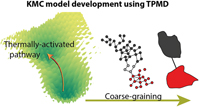Article contents
Accelerating rare events and building kinetic Monte Carlo models using temperature programmed molecular dynamics
Published online by Cambridge University Press: 21 December 2017
Abstract

The temperature programmed molecular dynamics (TPMD) method is a recent addition to the list of rare-event simulation techniques for materials. Study of thermally-activated events that are rare at molecular dynamics (MD) timescales is possible with TPMD by employing a temperature program that raises the temperature in stages to a point where the transitions happen frequently. Analysis of the observed waiting time distribution yields a wealth of information including kinetic mechanisms in the material, their rate constants and Arrhenius parameters. The first part of this review covers the foundations of the TPMD method. Recent applications of TPMD are discussed to highlight its main advantages. These advantages offer the possibility for rapid construction of kinetic Monte Carlo (KMC) models of a chosen accuracy using TPMD. In this regards, the second part focuses on the latest developments on uncertainty measures for KMC models. The third part focuses on current challenges for the TPMD method and ways of resolving them.
Information
- Type
- REVIEW
- Information
- Journal of Materials Research , Volume 33 , Issue 7: Focus Issue: Advanced Atomistic Algorithms in Materials Science , 13 April 2018 , pp. 835 - 846
- Copyright
- Copyright © Materials Research Society 2017
Footnotes
Contributing Editor: Enrique Martinez
This section of Journal of Materials Research is reserved for papers that are reviews of literature in a given area.
References
REFERENCES
- 10
- Cited by


